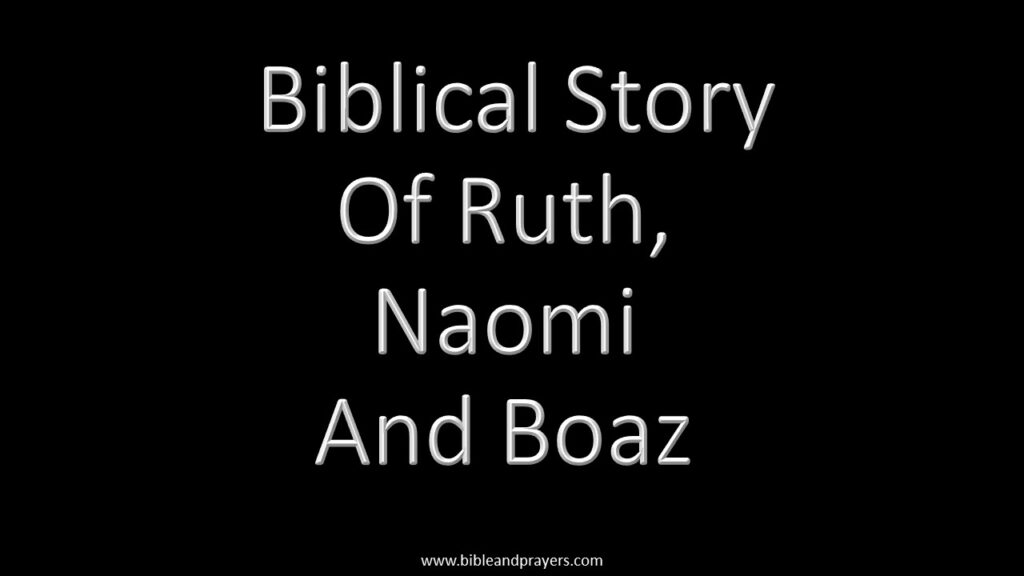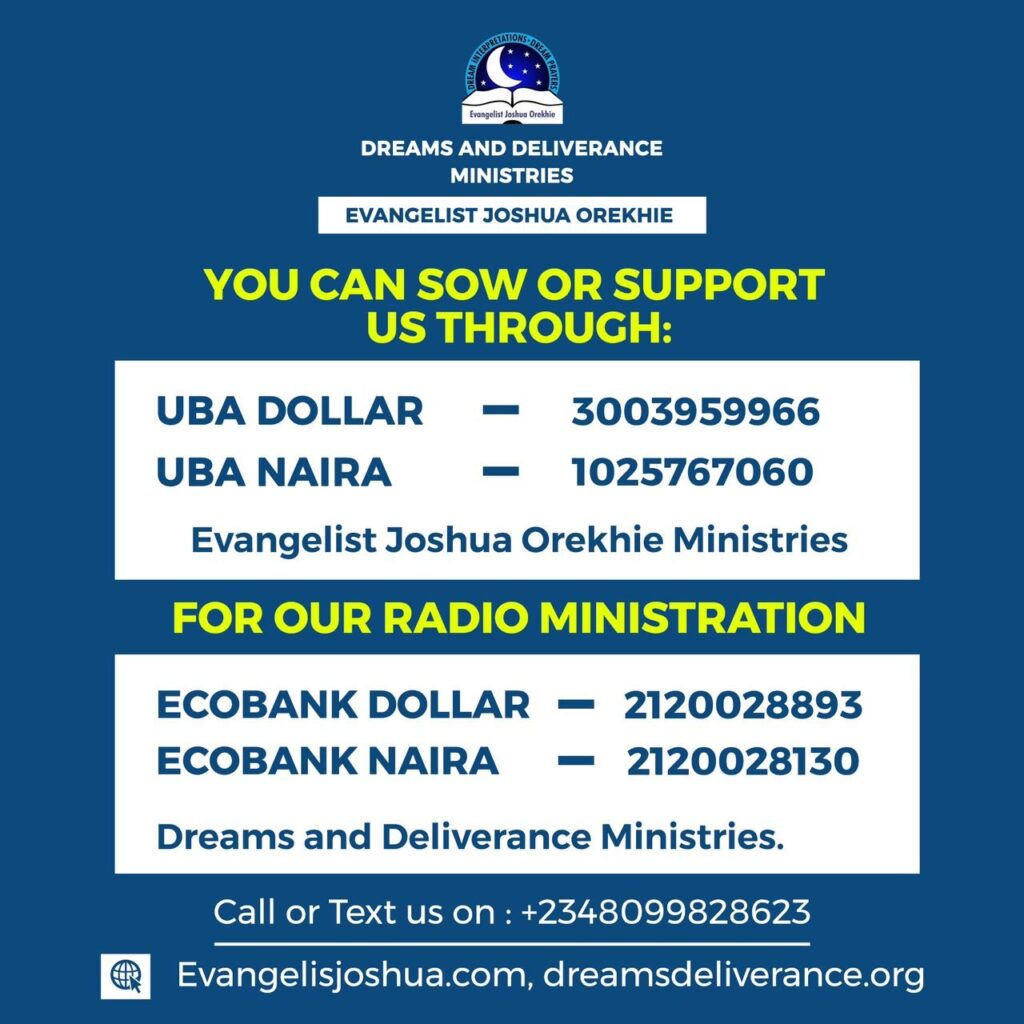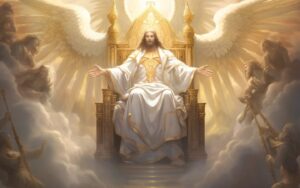Biblical Story Of Ruth, Naomi And Boaz
The story of Ruth, Naomi, and Boaz is a beautiful narrative of love, loyalty, and divine providence found in the Book of Ruth in the Old Testament.
The story begins with a woman named Naomi, her husband Elimelech, and their two sons relocating to Moab due to a famine in Bethlehem. Tragically, Elimelech and both sons pass away, leaving Naomi and her daughters-in-law, Ruth and Orpah, widowed. Facing a destitute future, Naomi decides to return to Bethlehem, urging her daughters-in-law to stay in Moab and remarry.
Ruth, however, chooses to stay with Naomi, expressing her loyalty and devotion. Her famous declaration to Naomi, “Where you go, I will go; where you lodge, I will lodge,” reveals her unwavering commitment.
Kindly watch Evangelist Joshua on Youtube
Subscribe NowBut Ruth replied, “Don’t urge me to leave you or to turn back from you. Where you go I will go, and where you stay I will stay. Your people will be my people and your God my God.
Where you die I will die, and there I will be buried. May the Lord deal with me, be it ever so severely, if even death separates you and me.”
(Ruth 1:16-17)
In Bethlehem, Ruth takes on the task of gleaning in the fields to provide for herself and Naomi. By divine providence, she ends up gleaning in the field of Boaz, a wealthy and honourable relative of Elimelech.
Boaz notices Ruth’s diligence and shows her kindness, instructing his workers to leave extra grain for her. Impressed by her reputation and her loyalty to Naomi, Boaz offers her protection and provisions.
Naomi, recognizing Boaz as a close relative with the right of redemption, orchestrates a plan for Ruth to present herself to Boaz on the threshing floor. Boaz, moved by Ruth’s actions and recognizing her virtue, agrees to redeem her and marry her, securing their family line.
Ruth and Boaz marry, and their union is blessed with a son named Obed. Obed becomes the grandfather of King David, emphasizing Ruth’s significant role in the lineage of Jesus Christ.
The story of Ruth, Naomi, and Boaz is a testament to faithfulness, kindness, and the providence of God. It highlights how individual acts of loyalty and virtue can become integral parts of a divine plan, shaping not only personal destinies but the course of history.
Below are lessons from each characters:
NAOMI
- Resilience in Adversity
Naomi’s story serves as a profound lesson in resilience, urging us to stand strong in the midst of adversity. Despite the heartbreaking losses of her husband and sons, Naomi doesn’t succumb to despair. Instead, she demonstrates remarkable strength and determination in navigating life’s challenges.
Her ability to endure and face difficulties head-on teaches us the importance of staying strong when life gets tough. It’s like a reminder that even in the darkest times, resilience empowers us to confront challenges with unwavering resolve, paving the way for eventual restoration and hope.
- Faithful Friendship
Naomi’s friendship with Ruth is a powerful illustration of the significance of unwavering companionship. Their bond teaches us the vital lesson of supporting and standing by one another, especially during challenging times.
Naomi and Ruth show us the true value of being there for our friends no matter what. It’s like a reminder that genuine companionship involves standing side by side in both joys and sorrows, creating a foundation of support that withstands the tests of time.
- Embracing Change
Naomi’s choice to return to Bethlehem after facing tragedy in Moab is a powerful lesson in embracing change and seeking restoration in familiar, faith-filled environments.
It teaches us about the significance of not resisting change but rather, finding solace and renewal in places rooted in faith. It’s like understanding that, in times of difficulty, returning to what’s familiar and faith-driven can be a source of healing and restoration.
- Recognition of Virtue
Naomi’s recognition of Ruth’s virtue is a poignant reminder for all of us to appreciate and affirm the goodness in those around us. Her acknowledgment becomes a lesson in fostering virtues, ultimately strengthening the bonds within the community.
Her actions encourage us to see and celebrate the positive qualities in others. It’s like a gentle nudge to acknowledge the goodness around us, contributing to a community where virtues are recognized and uplifted, fostering a positive and supportive environment.
- Acceptance of Support
Naomi’s journey, marked by initial bitterness, evolves into a powerful lesson about the importance of accepting support. Her eventual openness to the assistance provided by Boaz and Ruth teaches us a crucial life lesson: the value of being receptive to help and blessings from others. It underscores the fundamental truth that no person is designed to navigate life in isolation.
Her story teaches us to be open to receiving assistance when we face challenges. It’s like realizing that accepting help doesn’t diminish our strength; rather, it can lead to unexpected blessings and mutual growth. Naomi’s transformation becomes a reminder that in times of need, embracing the support of others is not a sign of weakness but a testament to our shared humanity.
- Strategic Planning
Naomi’s strategic guidance to Ruth on approaching Boaz imparts a valuable lesson on the significance of thoughtful planning when facing life’s challenges. This charges us to acquire the skill of navigating difficulties with wisdom.
It teaches us the importance of thinking ahead and making well-thought-out plans when dealing with obstacles. It’s like understanding that strategic planning is a powerful tool in overcoming challenges, ensuring that our actions are guided by foresight and wisdom. Naomi’s counsel becomes a reminder that approaching life’s hurdles with careful consideration can lead to more effective solutions and positive outcomes.
RUTH
1.Inclusion in God’s redemption plan
Ruth’s profound inclusion in the lineage of Jesus Christ serves as a powerful reminder of the expansive and inclusive nature of God’s redemption plan. In a time and society where lineage and heritage held immense significance, Ruth, a Moabite woman, breaks through cultural barriers to become an integral part of the lineage leading to the Messiah.
This inclusion challenges us to recognize that God’s redemptive purpose transcends societal norms and cultural boundaries. It emphasizes that individuals from diverse backgrounds, like Ruth, can play pivotal roles in God’s unfolding plan. It underscores the truth that God’s grace extends beyond borders, welcoming those who may be considered outsiders or marginalized.
This lesson encourages us to embrace diversity and to view every individual as a potential participant in God’s redemptive narrative. Ruth’s story teaches that God’s plan includes people from varied backgrounds, showcasing the richness of His grace and the universality of His purpose. It inspires us to cultivate a mindset of inclusivity, recognizing that God’s redemptive work knows no limits and encompasses all who respond to His call, regardless of their past or origins.
- Virtue and Modesty
Ruth’s modesty and virtuous character, acknowledged by Boaz, underscore the importance of being good and humble in how we behave.
Ruth’s way of carrying herself, being humble and doing what is right, is noticed and appreciated by Boaz. This teaches us that it’s crucial to be kind and modest in how we act. It’s like a reminder to choose goodness and humility in our everyday behavior.
- Openness to Guidance
Ruth’s openness to Naomi’s guidance on how to approach Boaz highlights the value of being receptive to wise advice and mentorship.
In other words, Ruth’s willingness to listen and follow Naomi’s suggestions teaches us the importance of being open to guidance from those with more experience. It’s like realizing that sometimes, the advice of someone who cares about us can provide valuable insights and direction in navigating life’s situations.
- Courage to Embrace Change
Ruth’s courage to leave her familiar homeland and embark on a new life in Bethlehem serves as a powerful example of facing substantial life changes with bravery and determination.
Her bold decision to start anew in Bethlehem teaches us about having the courage to embrace big changes in life. It’s like a reminder that sometimes, stepping into the unknown with bravery can lead to unexpected blessings and opportunities.
- Initiative and Hardwork
Her proactive initiative in gleaning in Boaz’s field is a compelling illustration of taking the lead and working diligently, setting a model for hard work.
Ruth’s hands-on approach to gleaning shows us the importance of taking the initiative and working hard in whatever we do. It’s like a lesson in putting effort and dedication into our tasks, demonstrating that diligence often leads to positive outcomes.
- Selflessness
Ruth’s choice to glean in the fields for Naomi’s sustenance is a profound display of selflessness, highlighting the virtue of prioritizing others’ needs over one’s own.
It teaches us about the beauty of selflessness—doing things for the benefit of others without expecting anything in return. It’s like a powerful lesson in kindness, demonstrating that acts of generosity and putting others first can have a lasting impact on the well-being of those we care about. Ruth’s selfless actions serve as an inspiration to cultivate a heart that considers and uplifts the needs of others.
BOAZ
1.Generosity and Kindness
Boaz’s exceptional generosity towards Ruth is beautifully captured in his actions of providing extra grain. This showcases the profound significance of kindness and generosity, particularly directed towards those in need.
In the scriptural verses found in the Book of Ruth, we see Boaz’s generosity in action:
So Boaz said to Ruth, “My daughter, listen to me. Don’t go and glean in another field and don’t go away from here. Stay here with the women who work for me.
Watch the field where the men are harvesting, and follow along after the women. I have told the men not to lay a hand on you. And whenever you are thirsty, go and get a drink from the water jars the men have filled.” (Ruth 2:8-9)
Boaz not only allows Ruth to glean in his fields but goes beyond the customary expectations, ensuring her safety and providing her access to water. His generosity is not just a provision of material needs but extends to creating an environment of security and care for Ruth.
These verses illuminate his heart of kindness and demonstrate to us the transformative impact of generosity. It sets a powerful example, urging us to extend kindness and generosity to those around us, recognizing that our actions can make a meaningful difference in the lives of others, just as Boaz’s generosity profoundly impacted Ruth.
- Faithfulness to God’s Principles
Boaz’s life in the story of Ruth becomes a living testimony to his faithfulness to God’s principles, emphasizing fairness, generosity, and responsibility. This commitment to spiritual values is evident in his interactions with Ruth and others.
Just then Boaz arrived from Bethlehem and greeted the harvesters, “The Lord be with you!”
“The Lord bless you!” they answered.
(Ruth 2:4)
Boaz’s greeting reflects his acknowledgment of the Lord and sets the tone for his actions. His commitment to God’s principles is further seen in his dealings with Ruth:
So Boaz said to Ruth, “My daughter, listen to me. Don’t go and glean in another field and don’t go away from here. Stay here with the women who work for me. Watch the field where the men are harvesting, and follow along after the women. I have told the men not to lay a hand on you. And whenever you are thirsty, go and get a drink from the water jars the men have filled.”
(Ruth 2:8-9)
Boaz not only allows Ruth to glean but ensures her safety and well-being, embodying the principles of kindness and protection. His commitment to fairness and responsibility is further demonstrated in the legal proceedings related to Ruth’s status:
Meanwhile Boaz went up to the town gate and sat down there just as the guardian-redeemer he had mentioned came along. Boaz said, “Come over here, my friend, and sit down.” So he went over and sat down.
Then Boaz announced to the elders and all the people, “Today you are witnesses that I have bought from Naomi all the property of Elimelek, Kilion and Mahlon.
I have also acquired Ruth the Moabite, Mahlon’s widow, as my wife, in order to maintain the name of the dead with his property so that his name will not disappear from among his family or from his hometown.”
(Ruth 4:1, 9-10)
In these verses, Boaz exemplifies responsibility by acting as a guardian-redeemer, ensuring the preservation of family lineage in accordance with God’s principles.
Boaz’s unwavering commitment to these spiritual values serves as a powerful example for us, emphasizing the transformative impact of aligning one’s actions with God’s principles. It encourages us to emulate such faithfulness in our own lives, recognizing that our adherence to these values can be a testament to our commitment to God.
CONCLUSION
Believers, let the profound lessons from the story of Ruth, Naomi, and Boaz resonate within your hearts and guide your actions. Let them mold your character and influence your interactions.
As you navigate life’s journey, may the story of Ruth, Naomi, and Boaz inspire you to live out these virtues, fostering a community rooted in love, kindness, and unwavering faith.






